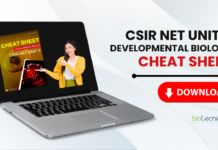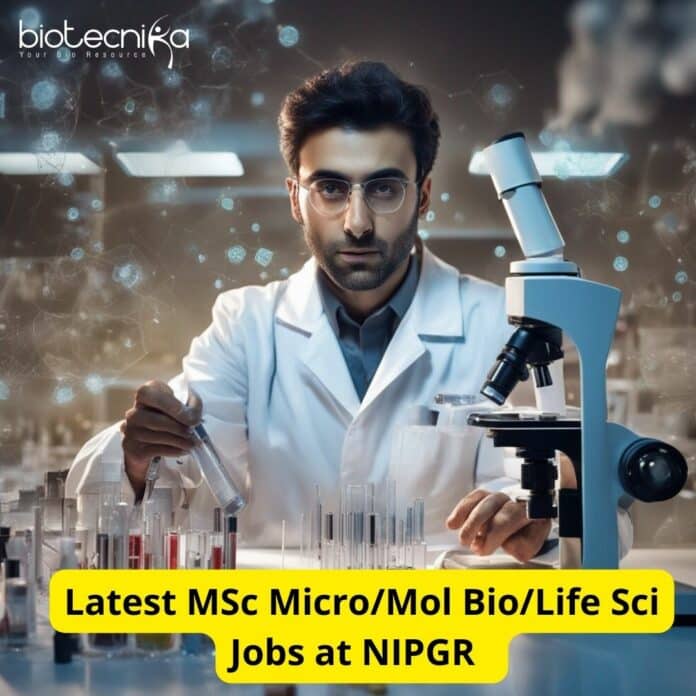NIPGR MSc Microbiology JRF at NIPGR. Applications are invited-JRF at NIPGR-Latest MSc job. Life science job opening 2023
Name of the Position: Junior Research Fellow (JRF)/Project Associate-I (PA-I)
No. of Posts: 01
NATIONAL INSTITUTE OF PLANT GENOME RESEARCH
Aruna Asaf Ali Marg, P.O. Box No. 10531, New Delhi – 110 067
Date: 14-08-2023
Applications are invited from suitable candidates for filling up the purely temporary positions of one Junior Research Fellow (JRF)/Project Associate-I (PA-I) in the scheme of “Short-Term Research Fellowship”, NIPGR under the supervision of Dr. Senthil-Kumar Muthappa, Scientist-V, NIPGR. Emoluments will be as per NIPGR fellowship norms & DBT/DST norms.
Upper age limit: 35 years (for PA-I).
Eligibility:
- Candidates having Master’s degree in Microbiology/Molecular Biology/Life Sciences with at least 55% (or equivalent) marks can apply.
- The project work requires experience of working with microbes, host-pathogen interaction and this will be a shortlisting criteria.
- Experience in plant protein isolation/purification/identification, enzymatic assays, in gel kinase assay, Western bolt/immunostaining and Y2H/Co-IP/BiFC are preferred.
- The project is aimed to understand the molecular basis of sugar transporters in plant host/non-host-bacterial interaction with pathogenic
microbes. - Candidates with NET and also those who qualify as per the criteria mentioned in the DST
Office Memorandum number SR/S9/Z-08/2018 dated January 30, 2019 and SR/S9/Z-05/2019 dated July 10, 2020 are eligible to apply.
The position is purely temporary and are co-terminus with the scheme. The initial appointment will be for one year, which can be extended/curtailed on the basis of assessment of the candidate’s performance and discretion of the Competent Authority. NIPGR reserves the right to select the candidate against the above post depending upon the qualifications and experience of the candidates. Reservation of post shall be as per Government of India norms. The appointment may be terminated at any time by giving
one month notice by either side. The applicants will have no claim implicit or explicit for consideration against any regular position of NIPGR.
- Eligible candidates may apply by sending softcopy through e-mail in the given format with a cover letter showing interest along with self-attested softcopies of the mark-sheets, certificates, (from class X onwards) and proof of research experience
- A single pdf file, consisting of application form, cover letter, and all documents, must be sent to [email protected] within 15 days from the date of advertisement.
- The candidates must ascertain their eligibility before applying, as ineligible candidates will not be interviewed. Canvassing in any form or bringing influence, political or otherwise, will lead to disqualification of the candidate(s).
Note: ONLY soft copy of the application in the given format will be accepted. No. TA/DA will be paid for attending the interview. For any clarification candidates may contract Scientist in-charge through e-mail.
Contact details:
Dr. Senthil-Kumar Muthappa
Scientist-V
National Institute of Plant Genome Research (NIPGR)
New Delhi – 110067.
Email: [email protected]
Website: http://www.nipgr.ac.in/research/dr_skmuthappa.php
Possible interview questions with answers for the job role of JRF at NIPGR:
1:Can you describe your experience working with microbes and host-pathogen interactions?
Answer: Certainly. During my Master’s program in Microbiology, I had the opportunity to work on a project that focused on understanding host-pathogen interactions in microbial infections. I conducted experiments involving various techniques to study how pathogens interact with their host organisms, including microbial culturing, infection assays, and molecular analysis of the interactions. This experience has provided me with a solid foundation in studying microbial behaviors within host systems.
2:The project requires skills in plant protein isolation, enzymatic assays, and molecular techniques. Could you provide examples of projects or experiences where you have used these techniques effectively?
Answer: Of course. During my academic journey, I worked on a project where I successfully isolated and purified plant proteins using chromatography techniques. Additionally, I conducted enzymatic assays to characterize the functional properties of these proteins. Moreover, I have experience in molecular techniques such as Western blotting and immunostaining to analyze protein expression and localization. These skills were particularly valuable in investigating plant-microbe interactions and understanding the underlying molecular mechanisms.
3:The project aims to understand the molecular basis of sugar transporters in plant host-bacterial interactions. Can you outline your approach to tackling such a complex research objective?
Answer: Certainly. To tackle this complex research objective, I would begin by conducting a comprehensive literature review to understand the current state of knowledge in the field. I would then design experiments to investigate the role of sugar transporters in the context of plant-bacterial interactions. This might involve genetic manipulation of sugar transporter genes in both the plant and bacterial systems, followed by functional assays to assess changes in interactions. Additionally, I would employ techniques like Yeast Two-Hybrid (Y2H) assays and Co-Immunoprecipitation (Co-IP) to study protein-protein interactions related to sugar transport. The ultimate goal would be to uncover the specific molecular mechanisms that govern sugar transport in these interactions.
4:How do you envision contributing to this project’s success, and what motivates you to work on the molecular basis of plant-microbe interactions?
Answer: I am genuinely enthusiastic about the opportunity to contribute to this project. My strong academic background in Microbiology and Molecular Biology, combined with my hands-on experience in various techniques, positions me well to make meaningful contributions to the project. I am motivated by the potential implications of this research, as understanding the molecular basis of plant-microbe interactions can have significant applications in agriculture and disease control. Being able to contribute to advancements in this field and work alongside experienced researchers like Dr. Senthil-Kumar Muthappa at NIPGR is both inspiring and a driving force for my involvement in this project.
JRF at NIPGR, NIPGR MSc Microbiology, NIPGR MSc Microbiology
Follow BIOTECNIKA for more job updates.






























